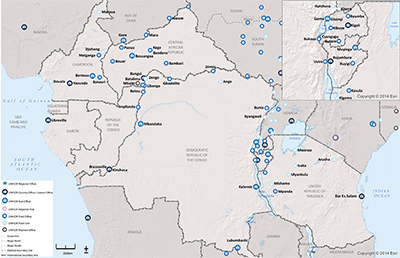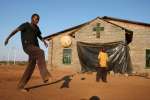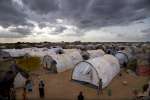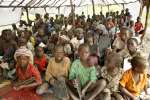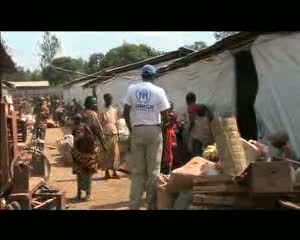Home > Where We Work > Africa > Central Africa and the Great Lakes > Burundi
2015 UNHCR subregional operations profile - Central Africa and the Great Lakes
| Overview |
Many Governments in the Central Africa and Great Lakes subregion have made great strides towards socio-economic development and institutional stability, both at national level, as well as in efforts towards subregional integration. However, this progress has been negatively affected by internal conflict and violence in the Central African Republic (CAR), the Democratic Republic of the Congo (DRC) and Nigeria. These situations have had dire humanitarian consequences within the countries concerned, and have also had a significant impact on neighbouring countries. Instability and violence continue to cause internal and external displacement, hindering humanitarian access and increasing the cost of operations.
The operational environment in the region in 2015 will continue to be marked by the situation in the CAR and its impact on neighbouring countries, as well as by the ongoing instability in the eastern DRC and in Nigeria. UNHCR's planning figures for 2015 estimate that by the end of 2015, there will be some 5.1 million refugees, asylum-seekers and internally displaced people (IDPs) of concern to the Office in the subregion, with assistance being planned for some 3.7 million.
In the CAR, the escalation of conflict since December 2013 has left some 930,000 people internally displaced during 2014, while another 135,000 Central Africans have sought refuge in Cameroon, 22,000 in the DRC, 20,000 in Chad and some 10,000 in the Congo. The overall numbers of refugees from the CAR in these countries, including old caseloads, now stand at some 427,200. The situation in the CAR has also forced the flight of tens of thousands of third country nationals, mainly from Chad and Cameroon. the situation of the Chadian nationals in particular has posed a humanitarian problem since most of them had been settled in the CAR for many years and are second or third-generation Chadians with few, if any, links to their country of nationality.
In the eastern part of the DRC, the security situation still remains volatile and unpredictable, hampering humanitarian activities and preventing the return of some 429,000 DRC refugees currently living mainly in Burundi, Rwanda, the United Republic of Tanzania (Tanzania) and Uganda. Over 2.6 million people are internally displaced in the DRC.
Following the conflict in the north-east of Nigeria between government forces and non-state actors, UNHCR has so far registered over 36,000 Nigerian refugees in Cameroon, bringing the total number of refugees in Cameroon to over 278,000. Along the border with Nigeria, there remain high risks of incursions into Cameroon, violence, robbery or kidnapping by Nigerian insurgents operating in the federal States of Yobe, Adamawa and Borno. Nigerian refugees have also fled to Niger and Chad.
Following the repatriation by June 2014 of some 119,000 of the DRC refugees who had fled from Equateur Province to the Congo in 2009-2010, the Congo still hosts some 23,200 DRC refugees, in addition to over 10,000 new arrivals from the CAR.
Refugees from the DRC are also present in significant numbers in Burundi (57,700) Rwanda (74,000) and in Tanzania (55,400). Smaller groups can also be found across the African continent, notably in Kenya, Uganda and Zambia.
The achievements of MONUSCO's Rapid Intervention Brigade in eastern DRC, resulting in the dismantling of one of the major insurgent groups, have led to more encouraging prospects of stabilization of the security situation. These operations are to be extended to target other groups and will potentially create conditions for the return of DRC refugees from Burundi, Rwanda and Uganda. The deployment of the MINUSCA force in the CAR is expected to help improve the protection of populations and strengthen national institutions, leading to an eventual presidential election. However, the situation remains unpredictable for 2015.
Despite this complex context, Governments in the subregion have continued to show a positive attitude towards the institution of asylum and respect for refugee law and principles.
While endeavouring to ensure that refugee rights are upheld, particularly those of people with specific needs including women, children and the elderly, and providing refugees with life-saving assistance, UNHCR's strategies for the subregion will continue to focus on the search for durable solutions, primarily voluntary repatriation in safety and dignity, as well as local integration and resettlement.
Durable solutions will be sought in particular for DRC refugees in Burundi, the CAR, the Congo, Rwanda, and Tanzania; for Angolan refugees in the Congo, and the DRC; for Burundian refugees in Rwanda, Tanzania and Uganda; and for Rwandan refugees in Burundi, the Congo and the DRC. The enhanced resettlement of Congolese refugees out of the Great Lakes will continue, as part of a comprehensive solutions strategy in Burundi, Rwanda, Tanzania and Uganda: at least 50,000 refugees are targeted for resettlement between 2012 and 2017. In September 2014, the President of the United Republic of Tanzania announced the resumption of the issuance of naturalization certificates to the Newly Naturalized Tanzanians (NNTs) - former Burundian refugees. Following this very welcome development, projects aimed at completing and supporting the local integration of the NNTs will be planned and implemented jointly with the Tanzanian Government to ensure a responsible and orderly phase-out, making sure they can enjoy all rights of citizenship.
Returnees from countries of asylum will benefit from UNHCR's protection monitoring and reintegration support. In the CAR and the DRC, IDPs will be assisted through established cluster mechanisms.
UNHCR will also endeavour to prevent statelessness for populations at risk, advocate for the issuance of birth certificates and support civil registration. UNHCR will advocate for further accessions to the 1954 and 1961 Conventions on Statelessness and to the Kampala Convention on IDPs.
| Response and implementation |
-
The situations in the CAR and Nigeria will continue to require some emergency responses to ensure delivery of basic services to refugees in the subregion; however, it is anticipated that refugee operations related to the CAR crisis will start to stabilize in Cameroon, Chad, the Congo and the DRC.
-
UNHCR and partners will work to meet refugees' basic needs in terms of health care, shelter, water, sanitation and education. Depending on various factors such as access and government policies, both camp and non-camp-based approaches will be used for the delivery of assistance, and community projects will be designed to benefit both refugees and local host populations.
-
In close coordination with the Governments concerned, UNHCR will seek to integrate assistance activities into national services (e.g. education and health care in Rwanda). UNHCR will make particular efforts to ensure the provision of sanitary materials to women. Livelihoods activities will be pursued to promote refugee self-reliance, especially in protracted situations, including for returnees and IDPs.
-
UNHCR's protection will aim at preserving the principle of non-refoulement and access to asylum. Community protection strategies will be translated into programmes targeting the priorities of children and addressing sexual and gender-based violence (SGBV). The Office will work with established networks to prevent sexual exploitation and abuse and implement its policy of zero tolerance. It will also engage in close cooperation with the authorities to ensure respect for the civilian character of asylum, in particular in conflict areas.
-
To facilitate voluntary repatriation and local integration, UNHCR will continue to work with the Governments in the region through tripartite mechanisms. The involvement and support of development actors will be sought to sustain the return of refugees (e.g. to the DRC and Rwanda) and IDPs (e.g. in Burundi and the DRC).
-
To pursue the reintegration of returnees, UNHCR, in coordination with One UN and respective government authorities, will aim to address the most immediate needs and promote peaceful cohabitation with local communities (e.g. in the DRC and Rwanda).
-
In the CAR and the DRC, UNHCR will continue to lead the protection cluster for IDPs in collaboration with governmental and non-governmental partners. The community-based protection strategy focuses on assuring the safety and providing life-saving assistance to beneficiaries. Ultimately, UNHCR's goal is to ensure that IDPs enjoy fundamental rights, have access to essential services while durable solutions are sought. UNHCR will continue to advocate for the accession of more countries in the subregion to the Kampala Convention on IDPs.
-
To prevent and reduce the risk of statelessness, UNHCR will promote the issuance of birth certificates to refugee children and populations at risk, and will advocate for further accessions to the Statelessness Conventions.
-
In urban situations, UNHCR will implement its Policy on Urban Refugees through civil society groups promoting community based protection, and fostering self-reliance. Independent legal refugee aid clinics will be supported.
-
For the major refugee crises in the subregion, The Office will continue to provide leadership with a regional perspective, given the number of countries impacted by these situations. UNHCR's Regional Refugee Coordinators will continue to provide a coordination platform for all concerned agencies, not only for improving services, but also in searching for solutions and ensuring coherence of strategies.
Operations in the Central African Republic, Cameroon, the Democratic Republic of the Congo, the Republic of the Congo, Rwanda and the United Republic of Tanzania with budgets of USD 25 million and more are presented in separate country chapters. For other countries where UNHCR operates in the subregion, please see below.
Burundi continues to be affected by the overall insecurity in the region, and in particular the instability prevailing in the Kivu provinces of the DRC. Plans for 2015 anticipate that Burundi will be hosting over 62,000 refugees and asylum-seekers, mostly from the DRC, as well as close to 80,000 IDPs.
It is anticipated that the Government will maintain its hospitality and provide protection for refugees in the country, as well as working in partnership with UNHCR and other organizations to assure basic services for refugees. Enhancing livelihood activities will be at the centre of UNHCR's strategy to promote self-reliance. Assistance will be extended to some 7,000 Burundians expected to return home by the end of 2015 mainly from the DRC and Uganda.
After UNHCR's office in Gabon was closed in January 2013, a small presence has been maintained in the country under the oversight of UNHCR's Regional Office in Kinshasa. As of 30 June 2014, Gabon was hosting just over 1,000 refugees and 1,860 asylum-seekers, mostly from the CAR, Chad, the Congo and the DRC.
UNHCR will support the Government in restructuring the refugee status determination procedure and will advocate for the extension to refugees of the mandatory health and social security insurance scheme.
Durable solutions will be pursued, including the implementation of the comprehensive strategy for refugees from Angola, the Congo, Liberia and Rwanda.
| Financial information |
Confronted with several major internal displacement and refugee crises within and from the CAR, the DRC and Nigeria during the year, in 2014 UNHCR launched two supplementary appeals for the CAR and Nigeria emergency situations respectively.
For 2015, financial requirements for the subregion are set at almost USD 461.5 million, with more than half of the budget allocated to the refugee programme. Should there be further significant displacement affecting countries in the subregion, any additional requirements not covered under this budget for 2015 will be presented subsequently.
| UNHCR 2015 budgets for Central Africa and the Great Lakes (USD) | ||||||
|---|---|---|---|---|---|---|
| Operation | 2014 Revised budget (as of 30 June 2014) |
2015 | ||||
| Refugee programme PILLAR 1 |
Stateless programme PILLAR 2 |
Reintegration projects PILLAR 3 |
IDP projects PILLAR 4 |
Total | ||
| Total | 494,378,430 | 288,531,538 | 3,730,164 | 53,283,535 | 115,909,567 | 461,454,804 |
| 1. Includes activities in Gabon and the Democratic Republic of the Congo (DRC). | ||||||
| Burundi | 25,098,771 | 18,676,158 | 189,402 | 0 | 523,504 | 19,389,064 |
| Cameroon | 54,123,629 | 53,920,679 | 843,987 | 0 | 0 | 54,764,667 |
| Central African Republic | 72,995,171 | 11,204,357 | 0 | 0 | 40,211,532 | 51,415,889 |
| Congo | 35,144,967 | 35,341,593 | 0 | 0 | 0 | 35,341,593 |
| Democratic Republic of the Congo Regional Office[1] | 216,361,233 | 99,881,583 | 2,696,775 | 38,546,652 | 75,174,531 | 216,299,541 |
| Rwanda | 51,859,332 | 43,089,569 | 0 | 80,776 | 0 | 43,170,345 |
| United Republic of Tanzania | 38,795,327 | 26,417,598 | 0 | 14,656,106 | 0 | 41,073,705 |
Source: UNHCR Global Appeal 2015 Update

